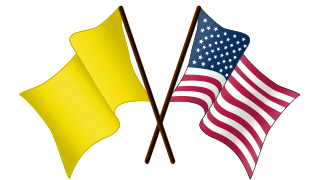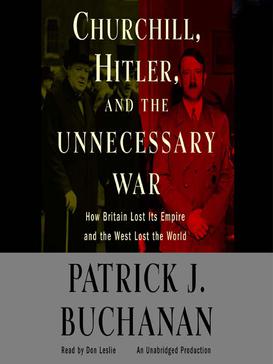
Patrick Joseph Buchanan is an American paleoconservative author, political commentator, and politician. Buchanan was an assistant and special consultant to U.S. presidents Richard Nixon, Gerald Ford, and Ronald Reagan. He is an influential figure in the modern paleoconservative movement in America.

Stephen Martin Walt is an American political scientist currently serving as the Robert and Renee Belfer Professor of international relations at the Harvard Kennedy School.
Neoconservatism is a political movement which began in the United States during the 1960s among liberal hawks who became disenchanted with the increasingly pacifist Democratic Party along with the growing New Left and counterculture of the 1960s. Neoconservatives typically advocate the unilateral promotion of democracy and interventionism in international relations together with a militaristic and realist philosophy of "peace through strength". They are known for espousing opposition to communism and radical politics.
Paleoconservatism is a political philosophy and a paternalistic strain of conservatism in the United States stressing American nationalism, Christian ethics, regionalism, traditionalist conservatism, and non-interventionism. Paleoconservatism's concerns overlap with those of the Old Right that opposed the New Deal in the 1930s and 1940s as well as with paleolibertarianism. By the start of the 21st century, the movement had begun to focus more on issues of race.

Paleolibertarianism is a right-libertarian political activism strategy aimed at uniting libertarians and paleoconservatives. It was developed by American anarcho-capitalist theorists Murray Rothbard and Lew Rockwell in the American political context after the end of the Cold War. From 1989 to 1995, they sought to communicate libertarian notions of opposition to government intervention by using messages accessible to the working class and middle class people of the time. They combined libertarian free market views with the cultural conservatism of paleoconservatism, while also opposing protectionism. The strategy also embraced the paleoconservative reverence for tradition and religion. This approach, usually identified as right-wing populism, was intended to radicalize citizens against the state. The name they chose for this style of activism evoked the roots of modern libertarianism, hence the prefix paleo. That founding movement was American classical liberalism, which shared the anti-war and anti-New Deal sentiments of the Old Right in the first half of the 20th century. Paleolibertarianism is generally seen as a right-wing ideology.

Sir Niall Campbell Ferguson, is a British-American conservative historian who is the Milbank Family Senior Fellow at the Hoover Institution and a senior fellow at the Belfer Center for Science and International Affairs at Harvard University. Previously, he was a professor at Harvard University, the London School of Economics, New York University, a visiting professor at the New College of the Humanities, and a senior research fellow at Jesus College, Oxford. He was a visiting lecturer at the London School of Economics for the 2023/2024 academic year and at Tsinghua University, China, from 2019 to 2020. He is a co-founder of the University of Austin, Texas.

Max Boot is a Russian-born naturalized American author, editorialist, lecturer, and military historian. He worked as a writer and editor for The Christian Science Monitor and then for The Wall Street Journal in the 1990s. Since then, he has been the Jeane J. Kirkpatrick Senior Fellow in National Security Studies at the Council on Foreign Relations and a contributor to The Washington Post. He has written for such publications as The Weekly Standard, the Los Angeles Times, and The New York Times, and he has authored books of military history. In 2018, Boot published The Road Not Taken, a biography of Edward Lansdale, which was a New York Times bestseller and a finalist for the Pulitzer Prize for biography, and The Corrosion of Conservatism: Why I Left the Right, which details Boot's "ideological journey from a 'movement' conservative to a man without a party", in the aftermath of the 2016 U.S. presidential election. His biography of Ronald Reagan, Reagan: His Life and Legend, was a New York Times Bestseller and named one of the New York Times' 10 Best Books of 2024, as well as one of the year's best books by The Washington Post and The New Yorker.

Robert David Kaplan is an American author. His books are on politics, primarily foreign affairs, and travel. His work over three decades has appeared in The Atlantic, The Washington Post, The New York Times, The New Republic, The National Interest, Foreign Affairs and The Wall Street Journal, among other publications.

Walter Russell Mead is an American academic. He is the James Clarke Chace Professor of Foreign Affairs and Humanities at Bard College and taught American foreign policy at Yale University. He was also the editor-at-large of The American Interest magazine. Mead is a columnist for The Wall Street Journal, a scholar at the Hudson Institute, and a book reviewer for Foreign Affairs, the bimonthly foreign policy journal published by the Council on Foreign Relations.
John B. Judis is an author and American journalist, an editor-at-large at Talking Points Memo, a former senior writer at the National Journal and a former senior editor at The New Republic.
The cyclical theory refers to a model used by historians Arthur M. Schlesinger Sr. and Arthur M. Schlesinger Jr. to explain the fluctuations in politics throughout American history. In this theory, the United States's national mood alternates between liberalism and conservatism. Each phase has characteristic features, and each phase is self-limiting, generating the other phase. This alternation has repeated itself several times over the history of the United States.
Neoconservatism and paleoconservatism are two major branches of the American conservative political movement. Representatives of each faction often argue that the other does not represent true conservatism. Disputed issues include immigration, trade, the United States Constitution, taxation, budget, business, the Federal Reserve, drug policy, foreign aid and the foreign policy of the United States.

The Monroe Doctrine is a United States foreign policy position that opposes European colonialism in the Western Hemisphere. It holds that any intervention in the political affairs of the Americas by foreign powers is a potentially hostile act against the United States. The doctrine was central to American grand strategy in the 20th century.

Official relations between Poland and the United States on a diplomatic level were initiated in 1919 after Poland had established itself as a republic after 123 years of being under foreign rule from the Partitions of Poland. However, ties with the United States date back to the 17th century, when the Polish–Lithuanian Commonwealth was one of Europe's largest powers, and many Poles immigrated to the Thirteen Colonies. During the American Revolutionary War, the Polish military commanders Tadeusz Kościuszko and Casimir Pułaski contributed greatly to the Patriot cause, with Kościuszko becoming a national hero in America. Since 1989, Polish–American relations have been strong and Poland is one of the chief European allies of the United States, being part of both NATO and the European Union. There is a strong cultural appreciation between the two nations (Polonophilia). According to the US Department of State, Poland remains a "stalwart ally" and "one of strongest Continental partners in fostering security and prosperity, throughout Europe and the world." Poland was also one of four participating countries in the American-led Iraq War coalition in 2003.

Churchill, Hitler, and the Unnecessary War: How Britain Lost Its Empire and the West Lost the World is a book by Patrick J. Buchanan, published in May 2008. Buchanan argues that both World War I and World War II were unnecessary and that the British Empire’s decision to join the wars had a cataclysmic effect globally. One of Buchanan's expressed purposes is to undermine what he described as a "Churchill cult" in America's elite. Buchanan focuses particularly on how Winston Churchill helped influence Britain into the world wars with Germany in 1914 and 1939.

The 2000 presidential campaign of Pat Buchanan, conservative pundit and advisor to both President Richard Nixon and Ronald Reagan, was formally launched on March 2, 1999, as Buchanan announced his intention to seek the Republican Party nomination for the presidency of the United States in the 2000 presidential election. It marked Buchanan's third primary campaign for the presidency, following his bids in 1992 and 1996. Although he had not attained the nomination either time, he had been regarded as a consequential party figure. Early primary surveys found Buchanan polling in the single digits and following the publication of his book A Republic, Not an Empire, which generally advocated for noninterventionist and "America first" foreign policy, some within the Republican Party condemned Buchanan's foreign policy views. There began to be speculation that Buchanan would leave the Republican Party in favor of the Reform Party, a third party qualified for matching federal campaign funds.
History of the United States foreign policy is a brief overview of major trends regarding the foreign policy of the United States from the American Revolution to the present. The major themes are becoming an "Empire of Liberty", promoting democracy, expanding across the continent, supporting liberal internationalism, contesting World Wars and the Cold War, fighting international terrorism, developing the Third World, and building a strong world economy with low tariffs.

New York real estate magnate Donald Trump announced the creation of a presidential exploratory committee on the October 7, 1999, edition of Larry King Live on CNN. Although Trump had never held elected office, he was well known for his frequent comments on public affairs and business exploits as head of The Trump Organization. He had previously considered a presidential run in 1988 as a Republican, but chose not to run. For 2000, Minnesota Governor Jesse Ventura persuaded Trump to seek the presidential nomination of the Reform Party, which was fracturing despite achieving ballot access and qualifying for matching funds as a result of businessman Ross Perot's 1996 presidential campaign on the party's ticket.

This article describes the foreign policy positions taken by Donald Trump during his 2016 presidential campaign.

The Field of Fight: How We Can Win the Global War Against Radical Islam and its Allies is a book on United States national security strategy coauthored by Michael T. Flynn and Michael Ledeen. Published by Macmillan's imprint St. Martin's Press in 2016, it argues that the United States is engaged in a religious world war against what the authors call "Radical Islam"—defined as a violent "tribal cult" emanating from a "failed civilization"—but has so far been hampered in its response by political correctness. The authors claim that the United States and its allies face "an international alliance of evil countries and movements that is working to destroy us" and advocate a combination of increased military action and ideological warfare in response. They identify a range of enemies of which Iran is the foremost, and advocate a strategy of regime change aimed at overthrowing the Iranian government as a key step towards defeating "Radical Islam".













